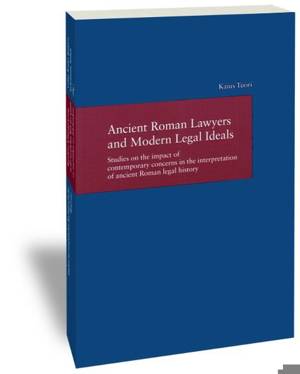
- Retrait gratuit dans votre magasin Club
- 7.000.000 titres dans notre catalogue
- Payer en toute sécurité
- Toujours un magasin près de chez vous
- Retrait gratuit dans votre magasin Club
- 7.000.0000 titres dans notre catalogue
- Payer en toute sécurité
- Toujours un magasin près de chez vous
Ancient Roman Lawyers and Modern Legal Ideals
Studies on the Impact of Contemporary Concerns in the Interpretation of Ancient Roman Legal History
Kaius Tuori
45,45 €
+ 90 points
Description
The book explores the effects that the ideals of modern law had to ancient Roman jurists, or rather, how later authors describing Roman jurists knowingly or unknowingly made the Romans reflect the ideals and virtues of their own time. It is claimed that many of the 19th century scholars presented Romans almost as Germans in togas. Through the lives and works of classical Roman jurists, such as Q. Mucius Scaevola, Labeo, Capito, and Salvius Julianus, the book traces the emergence of the ideals of legal system, autonomy of law, and the codification of law in the historiography of Roman jurists. These three ideals were typical of the modern 19th century view of the law. In order to grasp the impact of contempory concerns, the accounts of the ancient Romans are compared with the writings of legal historians from the 16th century to the present. The observation of changes in the historical interpretations is a good indicator of how, for example, the interpretations on the scientific nature of law made from the 16th century to 19th century reflect the ideals of their time. The birth of modern law and modern historiography during the 19th century changed the historical image of Roman law dramatically. The practical Roman law which was implemented by the contemporaries was changed into the historical Roman law with an aesthetical value as a classical model. The end of the practical use of Roman law released the history of Roman law to legal history itself, but the narratives made to justify its use still continue.
Spécifications
Parties prenantes
- Auteur(s) :
- Editeur:
Contenu
- Nombre de pages :
- 220
- Langue:
- Anglais
- Collection :
- Tome:
- n° 220
Caractéristiques
- EAN:
- 9783465040347
- Date de parution :
- 01-05-07
- Format:
- Livre broché
- Format numérique:
- Trade paperback (VS)
- Dimensions :
- 160 mm x 239 mm
- Poids :
- 385 g

Les avis
Nous publions uniquement les avis qui respectent les conditions requises. Consultez nos conditions pour les avis.






